Are you struggling to connect with your customers?
In the face of the coronavirus pandemic, online business competition is tougher than ever, as a tidal wave of businesses ramps up their websites and social media channels to compensate for the slump in physical store visits.
Ecommerce personalization is essential if you are going to stand out.
We live in a customer-centric era where customer relationship management is of paramount importance.
Regardless of what industry you are in, or what your products or services are, you need to prove that you understand your customers for example – and show you can deliver on their needs.
With the right eCommerce business website (realized with a ready-made solution like bootstrap eCommerce template) and a customer relationship management (CRM) platform, your business can leverage the power of eCommerce personalization to enhance the customer experience, and boost your bottom line.
With a customer relationship management (CRM) platform, your business can leverage the power of eCommerce personalization for customer interaction to enhance the customer experience, and boost your bottom line.
Read on to discover the benefits of eCommerce CRM software in 2023, and then we’ll show you twelve effective ways you can use a CRM for eCommerce personalization.
Table of Contents
What is Ecommerce Personalization?
Ecommerce personalization is a marketing strategy that aims to deliver a better customer experience by offering targeted content, product recommendations, and special offers tailored to an individual user’s needs and interests.
This is made possible through data analysis, as companies can learn more about each customer by studying aspects like demographics, online browsing behaviors, purchasing habits, social interactions.
With eCommerce CRM software, your business can easily manage consumer data from all sources, which makes it possible to maximize the benefits. It is advisable to use the bootstrap admin templates that offer all the essential components required for a CRM project.
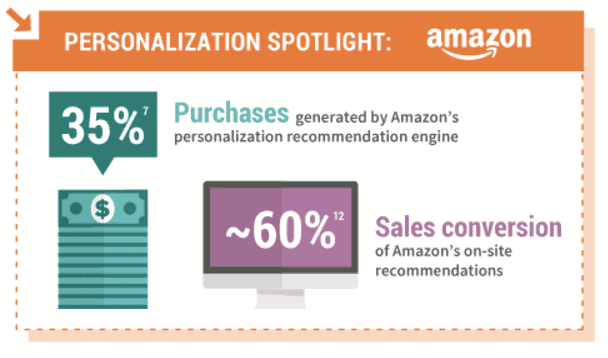
4 Benefits of Ecommerce CRM
- 1. Increased User Engagement
- 2. Make More Relevant Offers
- 3. Increased Revenue and Profits
- 4. Customer Loyalty
So, to look beyond the basic techniques, let’s consider the bigger picture. How can eCommerce personalization help your business? And how can an eCommerce CRM software help you go next-level?
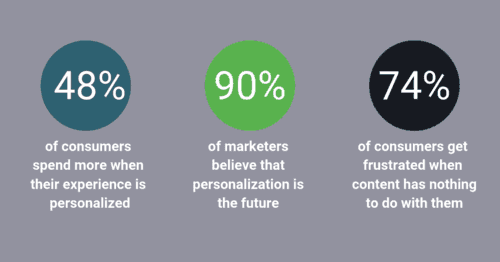
1. Increased User Engagement
Today’s consumers have an embarrassment of riches to choose from. If your brand is going to catch the eye, it has to be engaging.
Nowadays, personalization is the way to grab attention, as people appreciate the personal touch – and they remember it.
A study by HubSpot found that personalized calls-to-action (CTA) that are targeted to each user perform 202% better than generic CTAs that are the same for all site visitors.
When you use a CRM platform, you can track engagement data like email open rates and social media video views to gauge how your content is performing.
Using CRM and eCommerce together like this facilitates higher engagement levels, which results in more leads, and conversions.
2. Make More Relevant Offers
People want brands to know more about them. They like it when brands care, and they respond to personalization.
So much so, that when websites don’t use eCommerce personalization, people are deterred. Janrain reports that up to 74% of consumers hate when they see content that is irrelevant to their needs or interests.
By utilizing a CRM for eCommerce business, you will be able to leverage data insights to make timely, relevant offers to the right prospects.
3. Increased Revenue and Profits
With the relevant content and offers in mind, you can see the impact of a personalization CRM on the company’s balance sheet.
According to Marketing Dive, companies lost out a collective $756bn because of ineffective practices in eCommerce personalization.
Hammering the point is a projection from Gartner, which estimates companies who do it right can increase their profits by 15% profit by 2020.
4. Customer Loyalty
The real success of a business is not in its ability to attract customers, but to keep them coming back.
By offering a personalized experience that lives long in the memory, you can build stronger relationships with customers, which encourages repeat business and brand loyalty.
Motista claims that people who develop an emotional connection with a brand will generate a higher lifetime value, and they are more likely to recommend the brand to others.
When you consider the impact of this on your business longevity, implementing eCommerce CRM software a no-brainer.
12 Ways You Can Use CRM for Ecommerce Personalization
- 1. Personalized Marketing
- 2. Segment Your Audience
- 3. Use Geo-Targeting to Improve Sales in Local Area
- 4. Reduce Abandoned Cart Rates
- 5. Increase Productivity
- 6. Centralize Your Social Media Marketing Campaigns
- 7. Improve Cross-Channel Marketing
- 8. Offer Better Customer Service
- 9. Get the Big Picture of Order Management
- 10. Increase Average Order Value
- 11. Boost After-Sales and Customer Retention
- 12. Refine Your Inventory Management
As customer relationships are an integral aspect of modern marketing, the benefits of using a CRM for eCommerce have become more apparent.
CRM platforms allow companies to manage their business relationships and unify teams to tap into the full potential of data.
The pressing need for better customer experience is driving more businesses to adopt a CRM platform.
When you see what a CRM system for eCommerce platform can do, it’s easy to understand the attraction.
Here are twelve ways you can use a CRM and eCommerce personalization together.
1. Personalized Marketing
Ecommerce personalization is no secret.
Consumers know that marketing technology is out there to learn more about them and their interests.
Moreover, they welcome it, as 62% of consumers expect personalized offers based on their past purchases.
Anytime you login to your account, the categories you see will be tweaked to cater to your interests and previous search behaviors.
The retail giant, Amazon, attributes 35% of its revenue to personalized product recommendations.
Your business can use eCommerce CRM solutions to build up detailed profiles of your customers, which includes pertinent customer information, such as their:
- Name, Address, Gender
- Email address
- Purchase history
- Favorite categories
- Social interactions
Details like these make personalized marketing much more straightforward.
This level of customer information facilitates better communications on a one-to-one level, so your brand can win over more people.
2. Segment Your Audience
Going niche is nothing new. However, with advanced data analysis, you can go niche within your niche audience.
The best CRM systems for eCommerce platforms make it easy to collect and categorize consumer data, which paves the way for audience segmentation.
By grouping users with similar interests or demographics, you can create custom audiences, and market specifically to them.
In 2001, BMW released a series of short videos that proved to be a shining example of segmentation that was ahead of its time.
These high-octane videos were laser-targeted for young first-time drivers, aiming to capture their attention while they were young and uncommitted to any car brand.
Through this high-level segmentation, and a refreshing approach to marketing, the car manufacturer was highly successful in engaging a new audience.
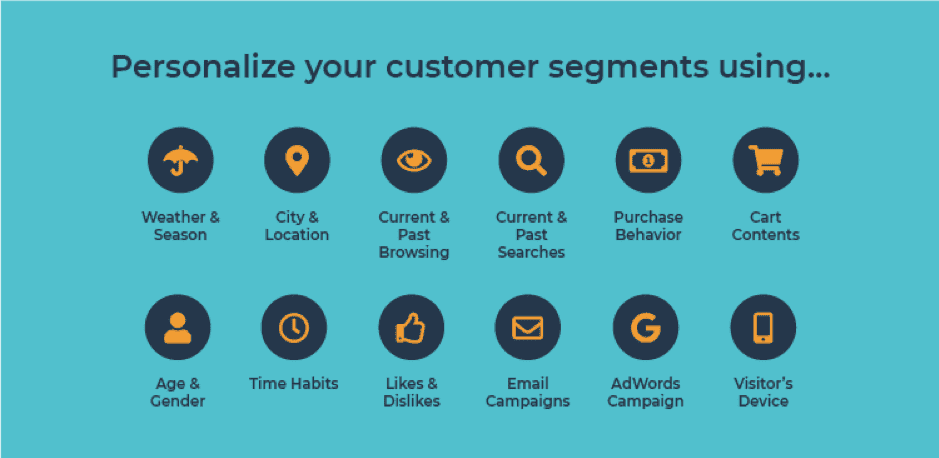
3. Use Geo-Targeting to Improve Sales in Local Area
Geo-targeting is a common type of audience segmentation where marketers target specific customers (or potential customers) according to their location.
By using data from your CRM platforms, you can make offers to people in specific countries, cities, or towns.
Amazon offers different products to different countries. It’s essential to use the right site if you want to receive your order.
Also, by choosing the store for your country, you can avail of customized offers for that country.
4. Reduce Abandoned Cart Rates
One of the biggest problems for eCommerce companies is the issue of abandoned carts. Lots of shoppers add items to their cart but then leave before checking out.
These warm leads are close to the end of the customer journey, which makes them low-hanging fruit for savvy email marketing professionals.
With a personalized abandoned cart email, you can give these people the little nudge they need to complete the purchase.
You can use a CRM for eCommerce to get smart data insights about every stage of your marketing funnel.
If people are dropping out at the last moment, it’s a clear sign that you need to improve the customer journey to make conversions come easier.
You already know that abandoned carts are a big problem for an eCommerce company. So, how can you tackle them?
With data and automated emails, you can retarget users who leave abandoned carts behind, and also smooth out any other bumps in your checkout process.
5. Increase Productivity
CRM systems thrive on automation.
They can quickly be configured to take charge of the most mundane or repetitive tasks, which frees up your workforce to focus on duties that will help generate more money for the business.
Forbes reports that the average sales reps only spend a third of their time on active selling. The rest of their time is consumed with problem-solving and tedious administrative issues.
By letting a CRM platform assist your teams, your sales and marketing professionals will have more time to focus on what they do best.
6. Centralize Your Social Media Marketing
Social media is crowded, but that’s no reason to avoid it. Social proof matters big time, and companies who put the effort in to establish a recognizable presence on social media platforms stand to gain a lot in the long-run.
You can use social media to build brand awareness, and also to get referrals and run paid advertising campaigns.
Furthermore, your responses to customer queries will help you develop a compelling brand voice and a reliable reputation that resonates with people.
With CRM systems, you can centralize all social media activity, ensuring you follow up promptly when needed, and are consistently building rapport with prospects across all channels.
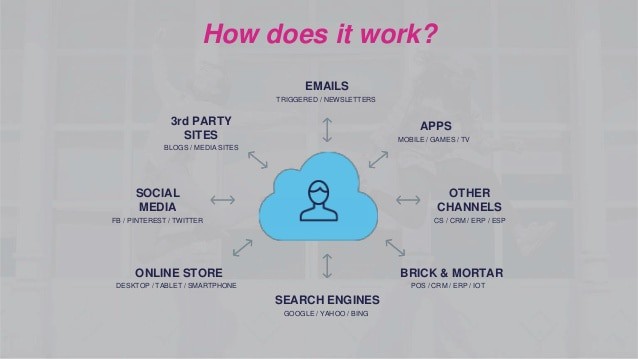
7. Improve Cross-Channel Marketing
You can use a CRM service to bring together more than your social media channels – it allows you to track every avenue, including email marketing, paid ads, website traffic, and video clicks.
Once, it was considered a wise move to focus on just one or two channels, but now, omnichannel marketing is regarded as the future of eCommerce.
The best way to track all your channels is with a CRM platform, as you can use the customer data from each one to optimize your entire brand experience.
By offering a seamless user experience from one digital touchpoint to the next, you’ll have more success in forging bonds with customers and will be more likely to convince them to make a purchase.
8. Offer Better Customer Service
As CRM solutions facilitate better communications and collaboration between marketing, customer support, and sales teams, you can break down silos in the workplace to offer a higher level of customer service.
Nobody likes to explain the same problem to a company every time they call in.
With a CRM system in your eCommerce business, you can streamline service as all customer service staff can stay updated with ongoing issues, and make the most appropriate responses as and when they are needed.
9. Get the Big Picture of Order Management
There are quite a few steps between lead generation and earning revenue. CRM platforms offer your business a holistic view of the complete buyer’s journey so that you can track orders through every stage, including:
- Order placement
- Processing & Dispatch
- Shipment Tracking
- Delivery
- Customer feedback
When you’re thinking about adopting CRM for eCommerce, the order management feature is one of the most vital functions to consider.
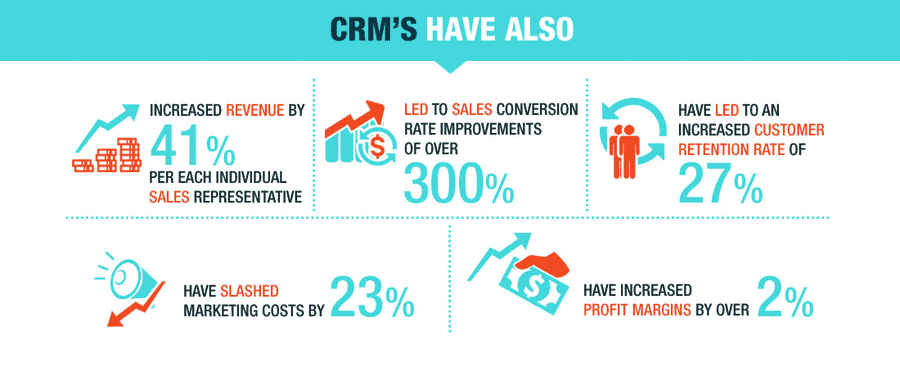
10. Increase Average Order Value
Personalization is a great way to boost the average order value (AOV) of sales.
When you leverage data from eCommerce CRM stores, you can entice consumers to spend more just by using the customer information from your dashboard.
Amazon has mastered this by showing related products to customers just as they reach the online store checkout.
This clever upselling tactic encourages impulse buys and helps drive sales volumes.
11. Boost After-Sales and Customer Retention
The customer relationship does not end with a sale. That is not the finish line, but merely a milestone in the grander scheme of things.
If you want to leverage data insights from a CRM, you can use it to continually improve the level of eCommerce personalization, which forges closer bonds with every customer.
This fosters brand loyalty, which, in turn, leads to an increase in customer lifetime value (CLV).
Studies show that brand loyalty among millennial consumers increases by an average of 28% after receiving personalized marketing.
As it costs less to retain existing customers compared to acquiring new ones, a CRM is a real boon for eCommerce businesses in this regard.
12. Refine Your Inventory Management
By focusing on increasing personalization in eCommerce, you inherently become a customer-centric brand.
With that being the case, your marketing and branding changes to cater to customers, and so too does the very products and services you offer.
Over time, with CRM data to guide you, your business will become very astute at understanding which products sell, and which don’t.
Soon, you can make better decisions about your inventory, and smarter projections about what you need to order.
This optimizes your budget, cutting your losses to a minimum as you only offer the products that are likely to generate a good ROI.
CRM in Ecommerce: Data-Driven Personalization is the Foundation of a Sustainable Business
And so, as business owners, there you have twelve effective ways of using the best eCommerce CRM to improve the level of personalization in your business.
Nowadays, consumers want personalized content and offers, and they won’t hang around for anything generic or irrelevant to their needs and interests.
When you use a CRM for eCommerce, you put data at the heart of your operations and enable your teams with deeper insights about your existing customers and the new prospects who peruse your website, social media channels, and online store.
This strategy makes it possible to offer a high level of eCommerce personalization and customer support, which only gets better over time.
In the long-term, that’s good news for your customers and the health and longevity of your brand as an online business, as you’ll have an eCommerce online store that people will keep coming back to, time and time again.
<<Use EngageBay’s intelligent CRM reporting to break down key metrics

